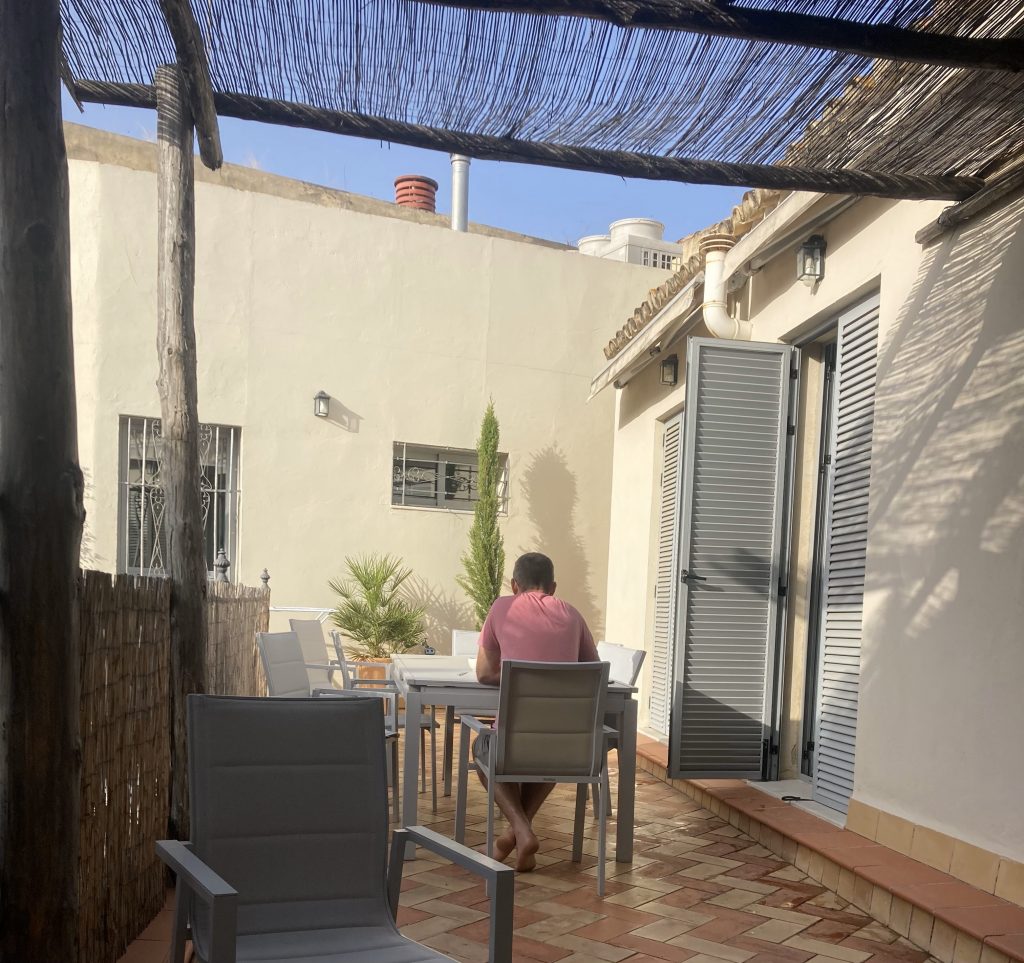Planning a workation away from your usual base? Choosing the right space for your remote office location is key to a successful stint working away. Once you’ve selected the city or region you’ll be working from, here’s what to look for in your workation apartment.
Connectivity
Reliable, high-speed wifi is no 1 on every digital nomad’s list for an effective digital workation. Connectivity is essential. Beware thick walls if your apartment is in a historic building, and make friends with the maintenance guys.
When the wifi went down during our first workation stint, it was only when we headed out to grab some lunch that we found a workman in the stairwell fiddling with the wires. Good timing – we were on the verge of losing the critical router on which our workation depended.
Added bonus: the building’s owner was on site at the same time, so we were invited to an impromptu full tour of the other (stunning) apartments in our block, an immaculately restored palace full of authentic architectural detail.
Workation tip: Ask the right questions about wifi before you book, and get chatty once you move in.
Workspace
If you’ve managed to negotiate a remote workation, odds are you rely on a laptop to keep your hustle on track. So choose a workation apartment that fits your personal working style. Unless you’re used to tapping away with a laptop on your knees in bed / on the sofa, scour photos of your accommodation for suitable workspace spots.
When we go on workation, my husband and I look for enough separate desk space within the apartment to accommodate a laptop, papers and privacy for when we are both on calls. You might appreciate a spare bedroom if your Zooms / Teams times clash.
Alternatively, is there a dining table and a breakfast bar? Or a dressing table that could double up as a desk, for at least some of the time? Imagine how you can make the space work for your needs.

Check images of your rental apartment for socket locations, suitable seating and – critically – air conditioning units if you’re working away somewhere in the sun. Heating will be key for a winter workation.
Lighting too is important. Is there natural light? Will lamps or overhead lighting be enough to work by? Consider taking a small LED lamp with you – it will help open up your apartment and potentially make dark corners useable for work.
Workation tip: Take a multi-socket or power tower with a long lead. And pack plenty of socket converters.
Location
Where is your workation apartment located? I recommend a residential rather than a heavily touristed area: you’re more likely to find handy local shops like a bakery, corner shop, bar or cafe. A neighbourhood print shop and library are useful when you need to get stuff done or want a quiet change of scene.
Staying in a residential area will be more like ‘real life’ and you are less likely to suffer from street noise. Research your proposed workation apartment on Google maps. Do windows overlook a cobbled street or a shared communal area? Cobbles make a racket when tourists pass by pulling roll-on luggage. Is your apartment on a busy route for guided walking tours? A stream of passers-by can be seriously disruptive if you want to keep windows open while you work.

Accommodation outside the main tourist drag is likely to come in cheaper than an apartment in the historic centre of whichever city you choose. You’re also contributing to the local economy if you buy from independent businesses in your temporary adopted neighbourhood.
Workation tip: Research how many other rental apartments in the block where you will be on workation. If others are on holiday while you are working, expect higher noise levels that could disturb your work vibe.
Long-term rentals
On the basis that you are renting your workation apartment for at least a month, you may find your landlord able to offer a discount on fees. Check whether there is a cap on power bills as the air con / heating can take a hammering if you’re in your apartment working for long hours. Consider skipping the weekly linen change / cleaning service and do it yourself instead. This will save your landlord costs, which they may be willing to reflect in the fees they charge you.
Check your apartment carefully for equipment and facilities. Many city centre rentals offer limited cooking equipment as they cater mainly for short-term stays – will you need an oven, hob or dishwasher?
Workation tip: Ask for a spare set of sheets / towels if you’re planning on going DIY – and only do so if there’s a washing machine AND drying space in your workation apartment.
Integrate
Common complaints from local residents about increasing numbers of properties being rented out, concern the thoughtlessness of short-term let neighbours.
Putting out the rubbish on the wrong days, leaving hire bikes in communal hallways, keeping unsociable hours – even drying laundry over public balconies, feature in lists of annoying renter behaviours cited by residents in Spain. Be considerate and make an effort to live like a local when on workation.

Why not also research local clubs and pursue a new interest while you’re working away? Sports and crafts are a good place to start. Alternatively, volunteer with an eco group and join litter picks, gardening or neighbourhood clear-ups. Check social media for inspiration and get in touch.
It’s the perfect way to give back to the community you have joined temporarily, get to know some locals and maybe even forge lasting friendships.
Workation tip: Speaking the local language will help big time. Do some Duolingo before you go and consider classes while you are away.
Looking for a workation apartment in Spain? Try Genteel Home. We have used them several times – properties and service are excellent.


